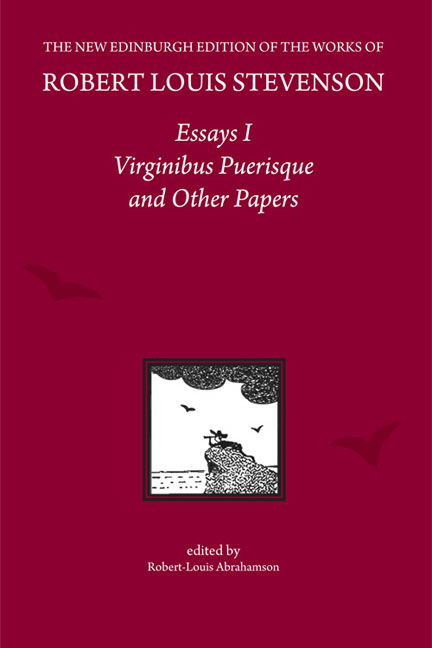Book contents
- Frontmatter
- Contents
- Acknowledgements
- Preface by the General Editors
- List of Abbreviations
- Chronology of Robert Louis Stevenson
- Stevenson’s Essays
- Stevenson as Essayist
- Introduction
- VIRGINIBUS PUERISQUE AND OTHER PAPERS
- Appendices
- Note on the Text
- Emendation List
- End-of-Line Hyphens
- Explanatory Notes
The English Admirals
Published online by Cambridge University Press: 11 November 2020
- Frontmatter
- Contents
- Acknowledgements
- Preface by the General Editors
- List of Abbreviations
- Chronology of Robert Louis Stevenson
- Stevenson’s Essays
- Stevenson as Essayist
- Introduction
- VIRGINIBUS PUERISQUE AND OTHER PAPERS
- Appendices
- Note on the Text
- Emendation List
- End-of-Line Hyphens
- Explanatory Notes
Summary
‘Whether it be wise in men to do such actions or no, I am sure it is so in States to honour them.’—SIR WILLIAM TEMPLE.
THERE IS ONE story of the wars of Rome which I have always very much envied for England. Germanicus was going down at the head of the legions into a dangerous river—on the opposite bank the woods were full of Germans—when there flew out seven great eagles which seemed to marshal the Romans on their way; they did not pause or waver, but disappeared into the forest where the enemy lay concealed. ‘Forward!’ cried Germanicus, with a fine rhetorical inspiration. ‘Forward! and follow the Roman birds.’ It would be a very heavy spirit that did not give a leap at such a signal, and a very timorous one that continued to have any doubt of success. To appropriate the eagles as fellow- countrymen was to make imaginary allies of the forces of nature; the Roman Empire and its military fortunes, and along with these the prospects of those individual Roman legionaries now fording a river in Germany, looked altogether greater and more hopeful. It is a kind of illusion easy to produce. A particular shape of cloud, the appearance of a particular star, the holiday of some particular saint, anything in short to remind the combatants of patriotic legends or old successes, may be enough to change the issue of a pitched battle; for it gives to the one party a feeling that Right and the larger interests are with them.
If an Englishman wishes to have such a feeling, it must be about the sea. The lion is nothing to us; he has not been taken to the hearts of the people, and naturalized as an English emblem. We know right well that a lion would fall foul of us as grimly as he would of a Frenchman or a Moldavian Jew, and we do not carry him before us in the smoke of battle. But the sea is our approach and bulwark; it has been the scene of our greatest triumphs and dangers; and we are accustomed in lyrical strains to claim it as our own. The prostrating experiences of foreigners between Calais and Dover have always an agreeable side to English prepossessions.
- Type
- Chapter
- Information
- Essays IVirginibus Puerisque and Other Papers, pp. 73 - 82Publisher: Edinburgh University PressPrint publication year: 2018



